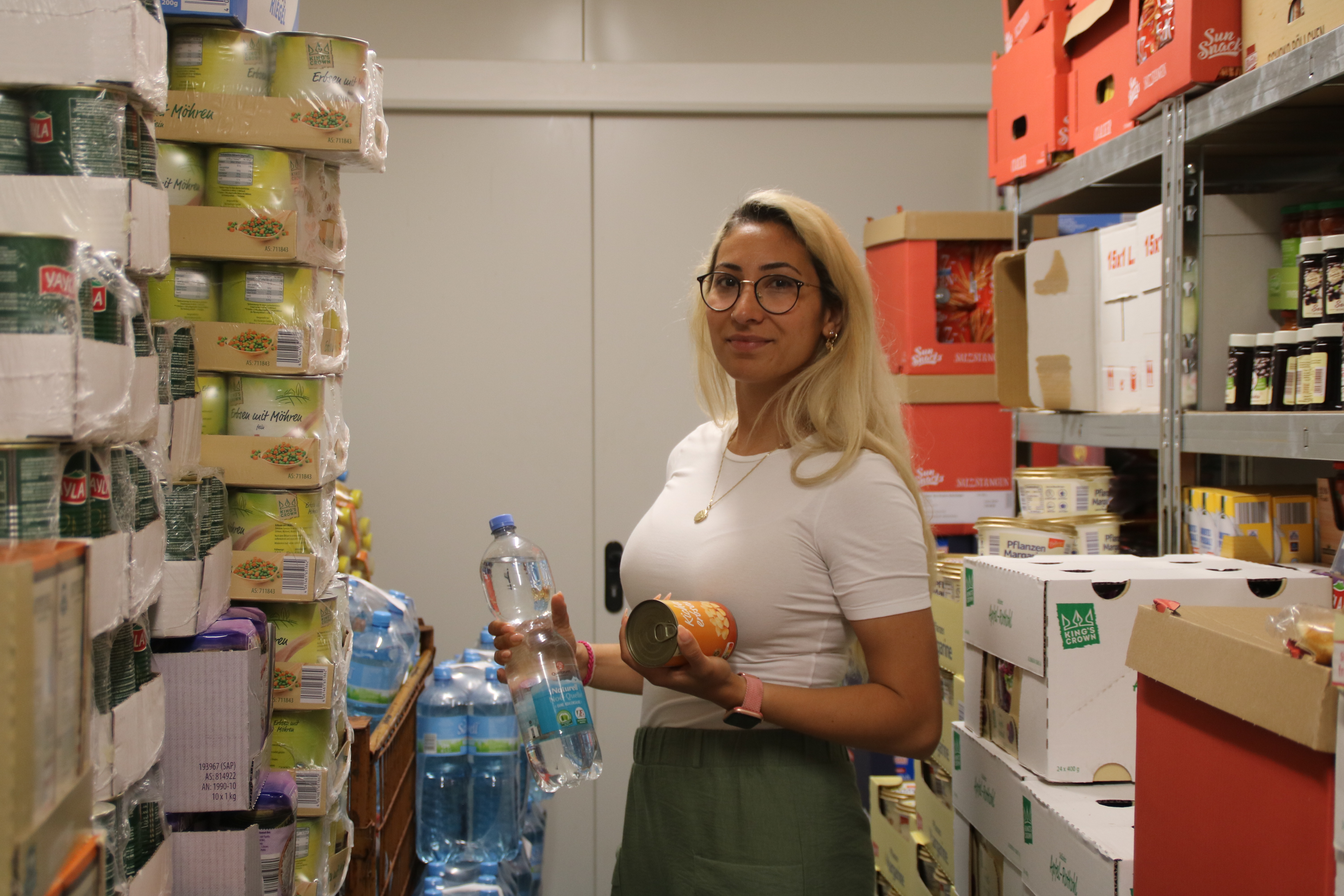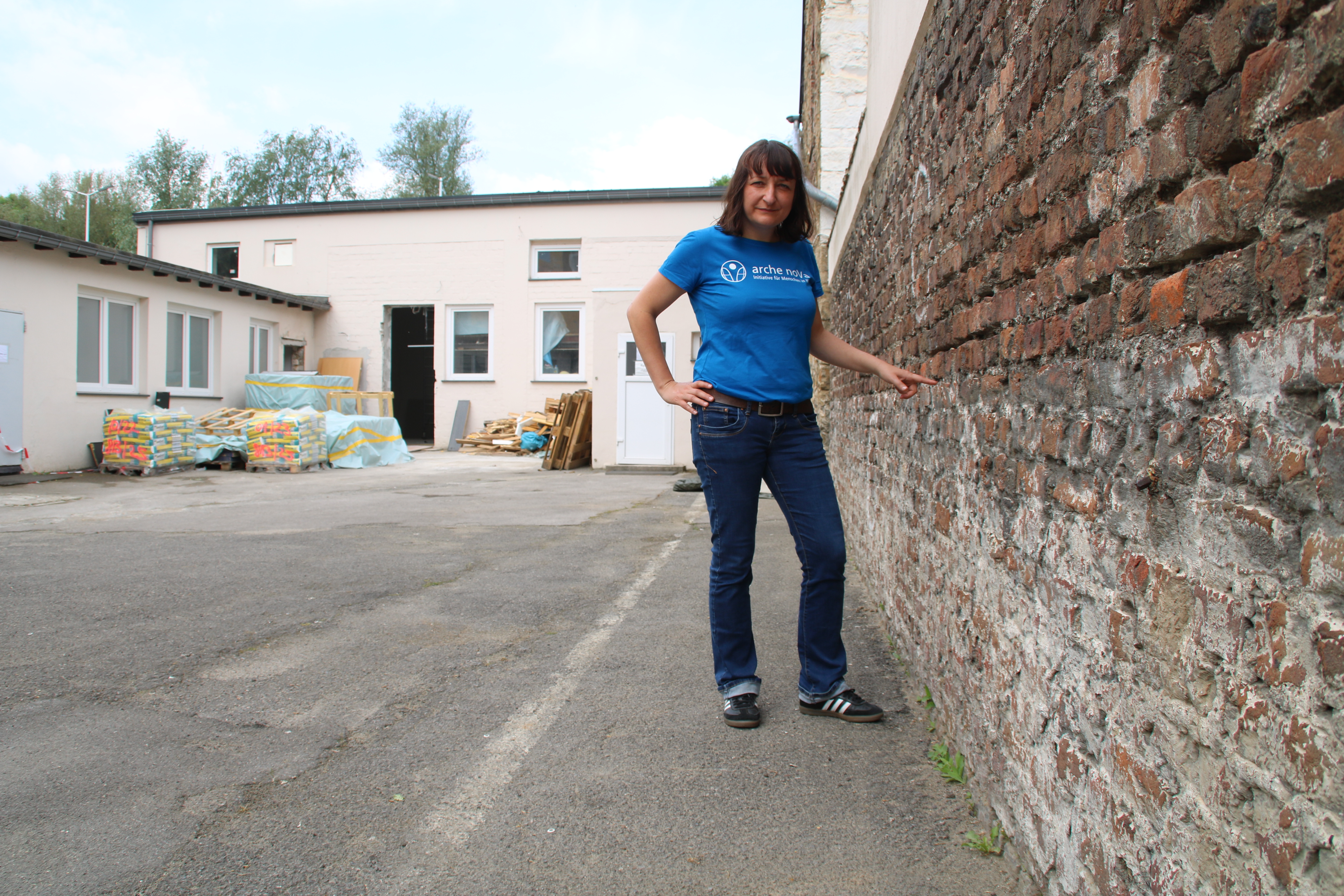When Duygu Ulfig stands in the food warehouse of the IG Mühle für Stolberg e.V. and looks at the full shelves, it becomes clear that the disaster is not over yet. "These supplies will all be distributed to those in need within a few days," she says, pointing to tins of peas and carrots, containers of mineral water and other basic foodstuffs piled up to the ceiling. Her association is an example of what many voluntary helpers have achieved in the places affected by the floods. How unbelievably violent the force of the catastrophe was. And how much still needs to be done.
Stolberg: Proximity to water became a downfall
The Rhineland town of Stolberg was hit particularly hard by the floods. Situated in a narrow valley bottom, the elongated inner-city nestles for several kilometres against the Vichtbach stream, which flows through Stolberg from south to north. This proximity was the city's undoing on 14 July 2021. The floods submerged the entire town centre. Almost all the shops were destroyed, the flats above them uninhabitable. Many people lost everything they owned. The Mühle district, located on the lower course of the river, was particularly affected. Even before the flood, many socially and economically disadvantaged people lived here. After the disaster, those affected were left with nothing. Without financial reserves, they had nowhere to go. The daily supply of essential goods became a central problem, not least because the power supply had collapsed, and the flood had also affected social institutions such as the Tafel. Many people also felt abandoned by the authorities. "On the third day, it looked the same as on the first. The emergency aid only arrived in the touristy and wealthier Oberstolberg," recalls Duygu Ulfig.
IG Mühle für Stolberg: Those affected help themselves
Together with her husband Enrique and a group of volunteers from the neighbourhood, Duygu Ulfig decided to take matters into her own hands in this situation. The group started to clean up the neighbourhood and organised donations in kind to provide the affected people with essential relief items. The initiative quickly gained momentum. More and more people began to get involved, organising actions for the affected people such as the big Christmas market to bring at least a bit of joy back into everyday life. By founding the association IG Mühle für Stolberg and setting up office containers in a municipal car park, more and more professional structures were created to care for those affected. In addition to food distribution, psychological counselling is now offered three times a week. In addition to the material damage, many people are also struggling with long-term psychological consequences. "Many are afraid," says Duygu Ulfig. "Panic about heavy rain, for example. And fear of going for shopping because there is no money."
Food distributions still important
Especially, the increased prices as a result of the Ukraine war are currently an additional problem for many affected people. Therefore, food distributions are still an important offer. arche noVa was able to provide important support with the flood project. By financing a delivery van as an emergency aid measure, we not only made it possible to transport urgently needed donations, but also, for example, brought back a bit of normality to affected children. The vehicle is not only a delivery van, but also has seats. "This allows us to give affected children a trip out of the city again as a distraction," says Duygu Ulfig. She also has numerous other plans for the future. "We have to carry on the respect and cohesion that was created by the floods," says Ulfig. To reduce the fear of contact between the different groups in the neighbourhood and to move the neighbourhood forward, she is planning regular citizens' meetings in which citizens, entrepreneurs, associations, tenants and landlords come together to jointly identify challenges in the community and find solutions.
Many affected flats only now ready for occupancy again
A visit to another association, WABe e.V., shows how many challenges the affected people still have to overcome one year after the flood. Before 14 July 2021, WABe e.V. operated three social department stores in Stolberg, where disadvantaged people often found the only opportunity to buy furniture for their flats. But the floods also hit the association hard. "Everything was destroyed here," says Ralph Kreitz of WABe e.V. Both the department stores and the offices, which were all located on the ground floor, were flooded. This meant that the association was out of action exactly when it was needed most urgently. Not only was it no longer able to offer its services to the affected people in Stolberg, but its own team was also extremely unsettled. Many employees with impairments work in the social department stores - at peak times up to 100 people. "The participants were afraid of losing their jobs," says Kreitz. Because this would also have meant the loss of security and routine in their everyday life. arche noVa was also able to provide emergency aid for this association. Through financial support for the purchase of a delivery van, WABe e.V. was able to transport furniture again shortly after the disaster. The importance of these transports is still great for those affected. Due to the long drying phase after the flood, many flats can only now gradually be moved back into, and the requests are increasing. The transports also benefit many refugees from Ukraine who require support in acquiring and transporting initial furnishings.
arche noVa still present on site with reconstruction aid
The consequences of the catastrophe are still present in other places affected by the floods. In Eschweiler, a few kilometres away, for example, it took more than half a year until the Kinderburg day-care centre, which had been destroyed by the floods, could resume operations at an alternative location. And construction work is still necessary in the new day-care centre premises. This also applies to many other buildings in the village. In addition, many of those affected are still waiting for insurance money and the renovation of their houses due to bureaucratic hurdles. Construction work is also still ongoing in the centre of Bad Münstereifel, which was heavily damaged by the Erft. And here, too, there are families who are only now, a year after the disaster, able to move back into their homes. The full extent of the consequences of the disaster is only now becoming visible. This applies to almost every individual case, and even more so to the social structures as a whole. Many non-profit organisations that make community life possible in the first place do not have the money to pay for their own share of state aid for projects. Here, but also in numerous other places, arche noVa will continue to support those affected with reconstruction aid.
Die Hochwasserhilfe von arche noVa in Zahlen*
- Direkt nach dem Hochwasser hat arche noVa mit rund 120.000 Euro Soforthilfe geleistet. Dies beinhaltete etwa die Lieferung von Bautrocknern und Hygienekits für die unmittelbar vom Hochwasser betroffenen Menschen im Katastrophengebiet
- Mit 12 gemeinnützigen Einrichtungen hat arche noVa bereits Verträge abgeschlossen für Wiederaufbauhilfe im Umfang von rund 327.000 Euro
- Zusätzliche sind bereits 8 weitere Projekte im Umfang von 424.000 Euro geplant, beziehungsweise stehen kurz vor der Vertragsunterzeichnung
Wir bedanken uns herzlich für die große Solidarität und die zahlreichen Spenden, die uns nach der Hochwasserkatastrophe erreicht haben. Dank Ihrer Unterstützung konnten wir nach der Katastrophe rasch und effizient Soforthilfe leisten. Ihre Spende ermöglicht uns zudem, auch weiterhin sicherzustellen, dass die nach wie vor großen Bedarfe gedeckt werden und die Mittel für den Wiederaufbau nachhaltig am richtigen Ort ankommen. (*Stand August 2022)















